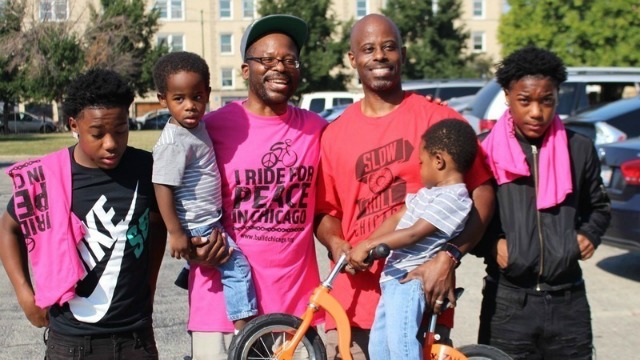Citing 'Racism,' Petition Says City Shouldn't Use Police To Enforce New Traffic Safety Plan
By Stephen Gossett in News on Sep 21, 2017 4:30PM

Change.org
The co-founder of a popular grassroots cycling group that leads rides on the south and west sides is calling for the removal of police traffic enforcement from the Vision Zero initiative, the city's plan to eliminate traffic fatalities and serious injuries within nine years.
The Vision Zero plan, which was released in June amid much anticipation, includes focuses on education, community engagement and street design changes, and also police engagement. It's that latter component that has Olatunji Oboi Reed, co-founder of the Slow Roll Chicago Bicycle Movement, skeptical, citing the presence of "racism" in the ranks of the Chicago Police Department.
He writes in the petition:
"We are calling for the City of Chicago to explicitly remove police traffic enforcement from the Vision Zero Chicago Action Plan and their implementation strategy. While police should continue to enforce citywide traffic laws, we do not support the role of the Chicago Police Department (where racism, implicit bias, inequity, corruption and overpolicing are all present) in executing a police traffic enforcement strategy as part of Vision Zero Chicago in communities of color."
Reed also shares in the petition a personal anecdote describing how a group of six to eight police officers once drove upon him and his friends and drew their weapons while the group was hanging out but doing nothing illegal. One of the police officers used a racial slur, Reed recounts.
The City of Chicago will get Vision Zero right in our neighborhoods, let's ride...https://t.co/lUiI9MmUkB pic.twitter.com/OqlnQi29kz
— Olatunji Oboi Reed (@theycallmeOboi) September 21, 2017
The Vision Zero initiative pinpointed eight High Crash Areas—all of which, aside from downtown, are on either the South or West sides, in areas labeled high-economic-hardship communities.
The initiative reads, "While enforcement is an important and effective tool to prevent dangerous driving behaviors, Chicago will work in partnership with communities and residents to ensure that all traffic safety interventions are fair, focused appropriately, and support the goals outlined in Vision Zero." Police involvement would be "driven by community input and support," the plan states.
The Tribune determined in March that Chicago's minority communities have seen a disproportionate number of cycling tickets.
As the Reader noted earlier this month, the cycling advocacy organization Active Transportation Alliance announced in August that it had postponed a Vision Zero summit in the wake of a blog post written by Reed, in which he took the summit to task for its $50 fee, weekday-morning start time and lack of engagement with people of color who live in the targeted neighborhoods in planning the meeting.
Reed followed up with a lengthy dive into the Vision Zero plan—in which he spoke with Charles Brown, a senior researcher at Rutgers' Transportation Center—on its need to tackle structural racial inequities. You can find it here.
Chicagoist has reached out for comment from the city and will update this post as necessary.